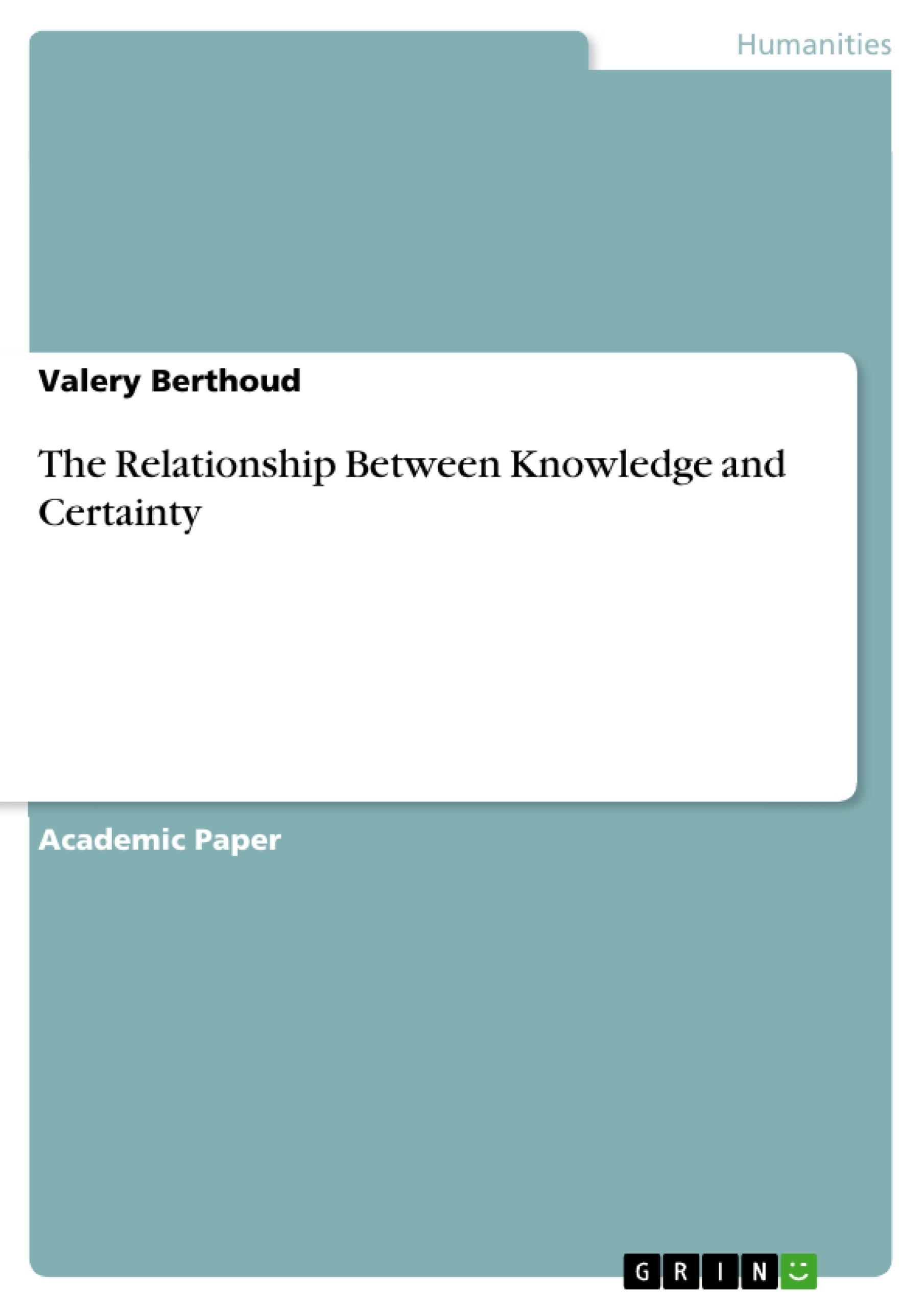The relationship between knowledge and certainty varies according to conception. I argue that knowledge and certainty are usually equivalent, but there are cases in which certainty is possible without knowledge and knowledge is possible without certainty.
The connection between knowledge and certainty does not change much when considering René Descartes’ philosophy because methodological skepticism consists of doubting beliefs that are uncertain. That there exist external objects is uncertain because a malicious demon could be deceiving us by creating the illusion of an external world.
Although Descartes suggests that we can doubt all of our beliefs, his conception of science consists of secure insight: “Omnis scientia est cognitio certa et evidens” (Descartes 1907). This means that all science is certain and evident knowledge, or a high degree of certainty.
Three centuries later, G. E.Moore had another reasoning when writing “A Defense of Common Sense” and “Proof of an External World.” He suggests that doubting that the world exists is unnecessary; we must trust that the universe exists. He is against George Berkeley’s suggestion that matter does not exist; everything is just ideas of the mind of God, and to be is to perceive. This is similar to propositions from Gottfried Wilhelm Leibniz, who was an idealist because he claimed that all possible worlds lie in God, and we are substances observing the best alternative (Leibniz 2014, §43-46).
Moore suggests that it is irrational to believe such premises. He held intuitions that a person has in everyday life, the common sense philosophy. We cannot be certain yet we claim to know many things. Moore also purports that the external world is real and he tried to prove it (Moore 1993a).
His argument goes as follows:
P1: Here is one hand.
P2: Here is another.
C1: There are at least two external objects in the world.
C2: Therefore, an external world exists.
He argues that he had the experience of observing his hands and reiterates that at least his hands offer the sum of two objects, which at a specified time existed (Ibid.).
Table of Contents
- Introduction
- Moore's Arguments Against Idealism and Skepticism
- Wittgenstein's Criticism
- Knowledge and Certainty
- Knowledge versus Certainty
- Objective and Subjective Certainty
- The Process of Learning
- Conclusion
Objectives and Key Themes
This paper examines the relationship between knowledge and certainty, arguing that while they are often equivalent, there are instances where certainty exists without knowledge and vice versa. The paper first explores Moore's arguments against idealism and skepticism, and then focuses on Wittgenstein's criticisms of these arguments.
- The interplay between knowledge and certainty
- Moore's defense of common sense and his critique of idealism
- Wittgenstein's critique of Moore's truisms
- The role of experience in shaping our understanding of knowledge and certainty
- The philosophical implications of the distinction between knowledge and certainty
Chapter Summaries
- Introduction: This section sets the stage for the paper by outlining the relationship between knowledge and certainty, emphasizing the possibility of certainty without knowledge and vice versa. It introduces the framework for exploring this relationship, drawing on Venn diagrams to illustrate the different regions where the concepts overlap and diverge.
- Moore's Arguments Against Idealism and Skepticism: This chapter delves into G.E. Moore's arguments against idealism and skepticism, highlighting his defense of common sense and his claim that the external world exists. It presents Moore's argument that we can know things with certainty, even if we cannot prove them, citing his "Proof of an External World" as an example.
- Wittgenstein's Criticism: This chapter explores Wittgenstein's critique of Moore's arguments, focusing on his analysis of Moore's truisms. It examines Wittgenstein's perspective on the relationship between certainty and language, and how our language games can shape our understanding of knowledge.
- Knowledge and Certainty: This chapter delves deeper into the complexities of the relationship between knowledge and certainty. It explores various aspects of this relationship, including the difference between objective and subjective certainty, and the role of learning in shaping our understanding of both concepts.
Keywords
This paper explores the concepts of knowledge, certainty, and their relationship to each other. Key themes include Moore's arguments for common sense, Wittgenstein's critique of truisms, idealism, skepticism, and the role of language in shaping our understanding of knowledge and certainty.
- Quote paper
- Valery Berthoud (Author), 2018, The Relationship Between Knowledge and Certainty, Munich, GRIN Verlag, https://www.grin.com/document/450141




